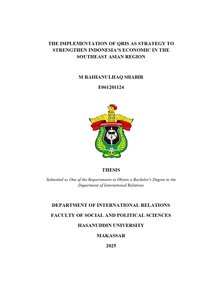Shabir, M. Raihanulhaq (2025) Implementasi QRIS sebagai Strategi Penguatan Ekonomi Indonesia di Kawasan Asia Tenggara. = THE IMPLEMENTATION OF QRIS AS STRATEGY TO STRENGTHEN INDONESIA’S ECONOMIC IN THE SOUTHEAST ASIAN REGION. Skripsi thesis, Universitas Hasanuddin.
![[thumbnail of Cover]](/48752/1.hassmallThumbnailVersion/E061201124-RU4WHP8G16FMX9dA-20250320151218.jpg)

E061201124-RU4WHP8G16FMX9dA-20250320151218.jpg
Download (295kB) | Preview
E061201124-1-2.pdf
Download (1MB)
E061201124-dp.pdf
Download (238kB)
E061201124-full text.pdf
Restricted to Repository staff only until 11 March 2027.
Download (3MB)
Abstract (Abstrak)
This thesis is written to explore the influence of the Quick Response Code Indonesian Standard (QRIS) in the Southeast Asia region as an Important Strategy to Strengthen Indonesia's economic position in regional integration. QRIS as a QR code-based payment standard developed by Bank Indonesia, not only facilitates fast, safe, and cheap financial transactions domestically, but also has the potential to become the backbone of cross-border payment system interoperability in Southeast Asia. By expanding the adoption of QRIS to Southeast Asia countries, Indonesia can drive economic growth through increased trade and tourism, by utilizing the convenience of integrated non-cash transactions. The implementation of QRIS in this region also supports financial inclusion, especially for micro, small, and medium enterprises (MSMEs), which are the backbone of the Indonesian economy. With access to a wider regional market, MSMEs can increase their competitiveness and contribute to national economic growth. In addition, QRIS interoperability can reduce cross-border transaction costs, increase supply chain efficiency, and strengthen the stability of the regional financial system. Challenges such as regulatory disparities, technological infrastructure, and cybersecurity risks are addressed through harmonization of technical standards and multilateral cooperation. QRIS also supports ASEAN's vision as a smart region by encouraging an inclusive digital economy. The implication is that QRIS not only facilitates non-cash transactions but also becomes an instrument of Indonesia's economic diplomacy, increases regional competitiveness, and accelerates post pandemic economic recovery.
| Item Type: | Thesis (Skripsi) |
|---|---|
| Uncontrolled Keywords: | QRIS, digital economic integration, Southeast Asia, MSMEs, financial inclusion, cross-border transactions. |
| Subjects: | H Social Sciences > H Social Sciences (General) |
| Divisions (Program Studi): | Fakultas Ilmu Sosial dan Ilmu Politik > Ilmu Hubungan Internasional |
| Depositing User: | Unnamed user with username pkl2 |
| Date Deposited: | 29 Aug 2025 02:48 |
| Last Modified: | 29 Aug 2025 02:48 |
| URI: | http://repository.unhas.ac.id:443/id/eprint/48752 |


